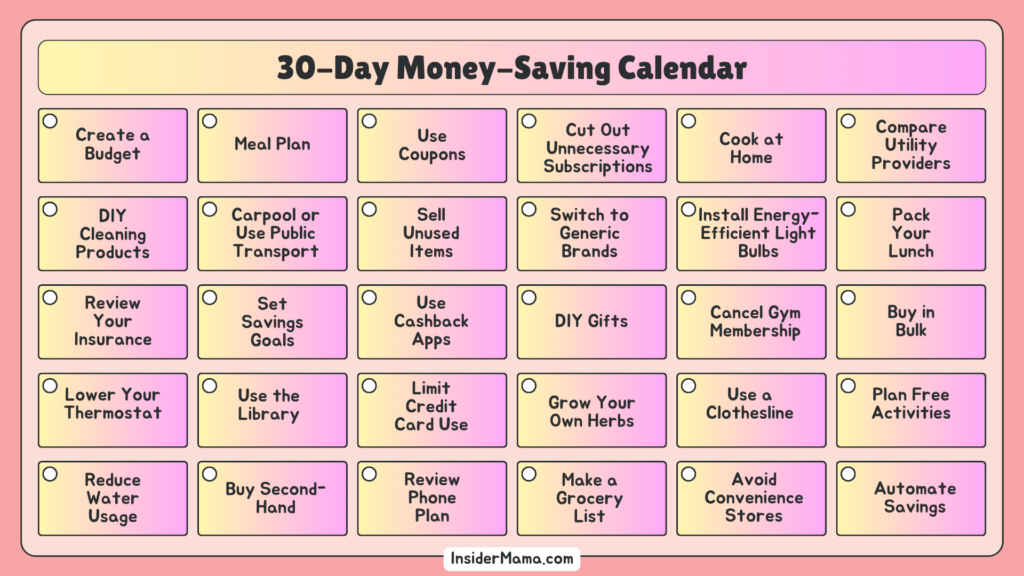Living cheaply isn’t just about saving money. It’s about getting the most out of what you have and finding joy in simplicity. Whether you’re trying to save for something big or just want to stretch your dollars further, there are plenty of ways to live as cheaply as possible without feeling deprived.

This site contains affiliate links; please view the disclosure for more information.
Budget Wisely to Live as Cheaply as Possible
A budget is your best friend when it comes to living cheaply. Start by tracking your income and expenses. Many apps can help with this, but a simple spreadsheet works too. Write down everything you spend money on, no matter how small. This will also help you see where your money is going and where you can cut back.
Categorize Your Expenses
Break your spending into categories like groceries, rent, utilities, and entertainment. This helps you see areas where you might be overspending. For instance, if you’re eating out a lot, consider cooking more meals at home. Home-cooked meals are not only cheaper but often healthier too.
Smart Shopping
When it comes to shopping, planning is key. Make a list before you go to the store and stick to it. This prevents impulse buys that can add up quickly. Also, consider buying generic brands instead of name brands. Often, the quality is just as good, but the price is much lower.
Use Coupons and Cashback Apps
Coupons can save you a lot of money. Look for them in newspapers, online, or on apps. Cashback apps are another great way to save. These apps give you money back on purchases you make, either in cash or gift cards. It might not seem like much at first, but over time, it adds up.
Reduce Utility Bills
Utility bills can be a significant part of your monthly expenses. There are several ways to reduce these costs. Start by being mindful of your energy use. Turn off lights when you leave a room, unplug electronics when they’re not in use, and consider using energy-efficient appliances.
Water-Saving Tips
Water bills can also be reduced with a few simple changes. Fix any leaks, take shorter showers, and turn off the tap while brushing your teeth. Installing low-flow shower heads and faucets can also help save water.
Cut Entertainment Costs
Entertainment doesn’t have to be expensive. There are plenty of ways to have fun without spending a lot of money. Look for free events in your community, such as concerts, festivals, and outdoor movies. Libraries often offer free programs and activities, too.
Enjoy the Outdoors
Nature offers endless entertainment for free. Hiking, biking, or simply taking a walk in the park can be enjoyable and relaxing. Plus, it’s also a great way to get some exercise.
DIY Whenever Possible
Do-it-yourself projects can save you a lot of money. Whether it’s home repairs, cooking, or crafting, doing things yourself instead of hiring someone or buying pre-made items can be much cheaper. Plus, it can be very satisfying to see what you can accomplish on your own.
Learn New Skills
Learning new skills can also save you money. For example, learning to sew can help you repair or alter your clothes instead of buying new ones. Cooking from scratch is usually cheaper and healthier than buying pre-made meals or eating out.
Second-Hand Shopping
Buying second-hand is also a great way to save money. Thrift stores, garage sales, and online marketplaces can be treasure troves of good deals. You can find clothes, furniture, and even electronics at a fraction of the cost of buying new.
Swapping and Borrowing
Swapping items with friends or family is another way to get what you need without spending money. Borrowing items, especially things you only need for a short time, can also save you a lot. For example, instead of buying a tool for a one-time project, see if you can borrow it from someone.
Meal Planning
Meal planning can help you save money and reduce food waste. Plan your meals for the week and make a shopping list based on what you need. This way, you’re less likely to buy items you don’t need and won’t end up throwing away food that goes bad.
Batch Cooking
Cooking in batches can save both time and money. Make large quantities of meals and freeze portions for later. This not only makes it easier to eat at home but also reduces the temptation to order takeout on busy days.
Transportation Savings
Transportation can be a big expense, but there are ways to cut costs. If you can, use public transportation, carpool, or ride a bike. Walking is another great option if you’re close to your destination. These options are often cheaper than driving, and they’re better for the environment too.
Maintain Your Vehicle
If you do drive, keeping your car well-maintained can save you money in the long run. Regular oil changes, tire rotations, and other maintenance tasks can prevent more costly repairs down the road.
Financial Assistance and Resources
Don’t be afraid to take advantage of financial assistance programs if you need them. There are many resources available to help with things like food, housing, and healthcare. Look into local, state, and also federal programs to see what you might qualify for.
Community Resources
Community centers and non-profits often offer free or low-cost services and programs. These can include anything from free classes and workshops to food pantries and clothing closets. Take advantage of these resources to help stretch your budget further.
Free Download: 30-Day Money-Saving Calendar

30-Day Money-Saving Calendar: Live as Cheaply as Possible
Use this calendar to implement one new money-saving tip each day for a month. Each tip is simple and practical, designed to help you live as cheaply as possible while maintaining comfort.
Day 1: Create a Budget
- Write down your income and expenses. Categorize them to see where your money goes.
Day 2: Meal Plan
- Plan your meals for the week to avoid unnecessary grocery trips and also to reduce food waste.
Day 3: Use Coupons
- Find and use coupons for groceries and household items.
Day 4: Cut Out Unnecessary Subscriptions
- Cancel any subscriptions you don’t use or need.
Day 5: Cook at Home
- Make a homemade meal instead of eating out.
Day 6: Compare Utility Providers
- Look for cheaper options for your utilities (electricity, gas, internet).
Day 7: DIY Cleaning Products
- Make your own cleaning products using simple ingredients like vinegar and baking soda.
Day 8: Carpool or Use Public Transport
- Reduce transportation costs by sharing rides or using public transit.
Day 9: Sell Unused Items
- Declutter and sell items you no longer need online or at a garage sale.
Day 10: Switch to Generic Brands
- Buy generic or store brands instead of name brands.
Day 11: Install Energy-Efficient Light Bulbs
- Replace old light bulbs with energy-efficient ones to save on electricity bills.
Day 12: Pack Your Lunch
- Bring your lunch to work instead of buying it.
Day 13: Review Your Insurance
- Check if you can get a better rate on car, home, or health insurance.
Day 14: Set Savings Goals
- Define clear savings goals and track your progress.
Day 15: Use Cashback Apps
- Download and use apps that give you cashback on purchases.
Day 16: DIY Gifts
- Make handmade gifts for upcoming birthdays or holidays.
Day 17: Cancel Gym Membership
- Find free workout routines online or go for a run outside.
Day 18: Buy in Bulk
- Purchase non-perishable items in bulk to save money over time.
Day 19: Lower Your Thermostat
- Adjust your thermostat by a few degrees to save on heating and cooling.
Day 20: Use the Library
- Borrow books, movies, and magazines from the library instead of buying them.
Day 21: Limit Credit Card Use
- Use cash for purchases to help control spending and also to avoid interest.
Day 22: Grow Your Own Herbs
- Start a small herb garden to save on buying fresh herbs.
Day 23: Use a Clothesline
- Dry clothes on a clothesline instead of using a dryer.
Day 24: Plan Free Activities
- Look for free local events and activities for entertainment.
Day 25: Reduce Water Usage
- Take shorter showers and fix any leaks to lower your water bill.
Day 26: Buy Second-Hand
- Shop at thrift stores or online marketplaces for clothes and furniture.
Day 27: Review Phone Plan
- Check if you can switch to a cheaper phone plan.
Day 28: Make a Grocery List
- Always shop with a list to avoid impulse buys.
Day 29: Avoid Convenience Stores
- Purchase items at grocery stores instead of convenience stores to save money.
Day 30: Automate Savings
- Set up automatic transfers to your savings account to ensure you save regularly.
Use this calendar to gradually implement money-saving habits into your daily life. Small changes can add up to significant savings over time.
Final Thoughts on Living as Cheaply as Possible
Living as cheaply as possible requires some effort and planning, but it’s definitely achievable. By making smart choices and being mindful of your spending, you can save money and still enjoy life. It’s not about feeling deprived; it’s about being resourceful and finding joy in the simple things.



